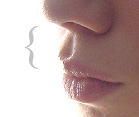philtrum
Jump to navigation
Jump to search
English
[edit]
Alternative forms
[edit]Etymology
[edit]Borrowed from the Latin philtrum (“a love potion”), from Ancient Greek φῐ́λτρον (phíltron, “a love charm; the dimple in the upper lip”).
Pronunciation
[edit]- IPA(key): /ˈfɪl.tɹəm/
Audio (Southern England): (file)
Noun
[edit]philtrum (plural philtra or philtrums)
- (anatomy) The shallow vertical groove running from the nasal septum to the center of the upper lip.
- Synonym: infranasal depression
- 2005, M. L. Kulkarni, Physical Examination of Children (Clinical Methods in Paediatrics; 2B)[1], India: Jaypee Brothers, page 142:
- Oral intercommissural distance (mouth width) and philtrum length are useful measurements for diagnosis of wide or large mouth (macrostomia), small mouth (microstomia), long philtrum and short philtrum and form ‘good handles’ in syndromic delineation.
- 2007, Loren J. Borud, Arin K. Greene, “Chapter 24: Lip Reconstruction”, in Josef E. Fischer, Kirby I. Bland, Mark P. Callery, editors, Mastery of Surgery[2], 5th edition, volume 1, page 301, column 3:
- Upper lip reconstruction is more difficult than lower lip reconstruction because the upper lip has a central structure, the philtrum. […] Wounds adjacent to the philtrum that are closed primarily may shift the philtrum to the affected side. However, with time, the philtrum will tend to return to its midline position.
- 2011, Hrishikesh Dubey, Mysteries of Vedic Face Reading[3], Categorization of the Philtrum According to Its Length:
- If the philtrum is long and deep, then these people are very romantic, sexual, lively and friendly.
- (zootomy) The junction between the two halves of an animal's upper lip or nose.
Derived terms
[edit]Translations
[edit]shallow vertical groove
|
See also
[edit]References
[edit]- “philtrum”, in Lexico, Dictionary.com; Oxford University Press, 2019–2022.
- “philtrum”, in Merriam-Webster Online Dictionary, Springfield, Mass.: Merriam-Webster, 1996–present.
- Henry Gray (1918) “XII. Surface Anatomy and Surface Markings”, in Anatomy of the Human Body[4], 2. Surface Markings of Special Regions of the Head and Neck
French
[edit]Etymology
[edit]From the Ancient Greek φίλτρον (phíltron), from φιλέω (philéō, “to love, to kiss”).
Noun
[edit]philtrum m (plural philtrums)
Further reading
[edit]- “philtrum”, in Trésor de la langue française informatisé [Digitized Treasury of the French Language], 2012.
Latin
[edit]Etymology
[edit]Borrowed from Ancient Greek φῐ́λτρον (phíltron, “a love charm”), derived from φῐλέω (philéō, “to love; to kiss”) + -τρον (-tron, instrument noun suffix).
Pronunciation
[edit]- (Classical Latin) IPA(key): /ˈpʰil.trum/, [ˈpʰɪɫ̪t̪rʊ̃ˑ]
- (modern Italianate Ecclesiastical) IPA(key): /ˈfil.trum/, [ˈfil̪t̪rum]
Noun
[edit]philtrum n (genitive philtrī); second declension
- (poetic, in the plural) love potion, philter
Inflection
[edit]Second-declension noun (neuter).
| Case | Singular | Plural |
|---|---|---|
| Nominative | philtrum | philtra |
| Genitive | philtrī | philtrōrum |
| Dative | philtrō | philtrīs |
| Accusative | philtrum | philtra |
| Ablative | philtrō | philtrīs |
| Vocative | philtrum | philtra |
Descendants
[edit]- → English: philter, philtrum
- French: feutre
- → Italian: filtro
- Sicilian: firtru
- → French: philtre (learned)
References
[edit]- “philtrum”, in Charlton T. Lewis and Charles Short (1879) A Latin Dictionary, Oxford: Clarendon Press
- philtrum in Gaffiot, Félix (1934) Dictionnaire illustré latin-français, Hachette.
Categories:
- English terms derived from Proto-Indo-European
- English terms derived from the Proto-Indo-European root *-trom
- English terms borrowed from Latin
- English terms derived from Latin
- English terms borrowed from Ancient Greek
- English terms derived from Ancient Greek
- English 2-syllable words
- English terms with IPA pronunciation
- English terms with audio links
- English lemmas
- English nouns
- English countable nouns
- English nouns with irregular plurals
- en:Anatomy
- English terms with quotations
- en:Animal body parts
- en:Face
- French terms derived from Ancient Greek
- French lemmas
- French nouns
- French countable nouns
- French masculine nouns
- Latin terms borrowed from Ancient Greek
- Latin terms derived from Ancient Greek
- Latin 2-syllable words
- Latin terms with IPA pronunciation
- Latin lemmas
- Latin nouns
- Latin second declension nouns
- Latin neuter nouns in the second declension
- Latin neuter nouns
- Latin poetic terms
- Latin terms suffixed with -trum